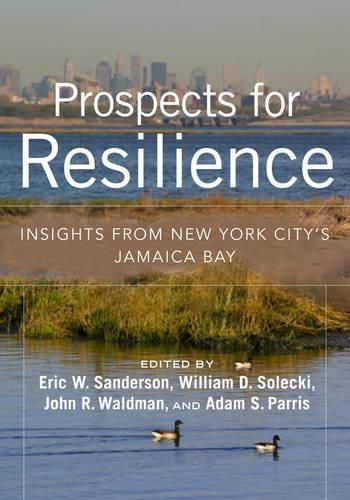Readings Newsletter
Become a Readings Member to make your shopping experience even easier.
Sign in or sign up for free!
You’re not far away from qualifying for FREE standard shipping within Australia
You’ve qualified for FREE standard shipping within Australia
The cart is loading…






Drawing on lessons from Jamaica Bay in New York City, the editors compile the insights of more than fifty scholars and practitioners on creating resilient cities that work with nature. Given the realities of climate change and sea level rise, coastal cities around the world are struggling with questions of resilience. Resilience, at its core, is about desirable states of the urban social-ecological system and understanding how to sustain those states in an uncertain and tumultuous future. How do physical conditions ecological processes, social objectives, human politics, and history shape the prospects for resilience? Most books set out the answer. This book sets out a process of grappling with holistic resilience from multiple perspectives, drawing on the insights and experiences of more than fifty Scholars and practitioners working together to make Jamaica Bay in New York-City an example for the world. Prospects for Resilience establishes a framework for understanding resilience practice in urban watersheds. Using Jamaica Bay, the largest contiguous natural area in New York, home to millions of New Yorkers, and a hub of global air travel with John F.Kennedy International Airport, the authors demonstrate how various components of social ecological systems interact, ranging from climatic factors to plant populations to human demographics. They also highlight essential tools for creating resilient Watersheds, including monitoring and identifying system indicators; computer modelling; green infrastructure; and decision science methods. Finally, they look at the role and importance of a boundary organisation like the new Science and Resilience Institute at Jamaica Bay in coordinating and facilitating resilience work, and consider significant research questions and prospects for the future-of urban watersheds. Prospects for Resilience sets forth an essential foundation of information and advice for researchers, urban planners, students and others who need to create more resilient cities that work with, not against, nature.
$9.00 standard shipping within Australia
FREE standard shipping within Australia for orders over $100.00
Express & International shipping calculated at checkout
Drawing on lessons from Jamaica Bay in New York City, the editors compile the insights of more than fifty scholars and practitioners on creating resilient cities that work with nature. Given the realities of climate change and sea level rise, coastal cities around the world are struggling with questions of resilience. Resilience, at its core, is about desirable states of the urban social-ecological system and understanding how to sustain those states in an uncertain and tumultuous future. How do physical conditions ecological processes, social objectives, human politics, and history shape the prospects for resilience? Most books set out the answer. This book sets out a process of grappling with holistic resilience from multiple perspectives, drawing on the insights and experiences of more than fifty Scholars and practitioners working together to make Jamaica Bay in New York-City an example for the world. Prospects for Resilience establishes a framework for understanding resilience practice in urban watersheds. Using Jamaica Bay, the largest contiguous natural area in New York, home to millions of New Yorkers, and a hub of global air travel with John F.Kennedy International Airport, the authors demonstrate how various components of social ecological systems interact, ranging from climatic factors to plant populations to human demographics. They also highlight essential tools for creating resilient Watersheds, including monitoring and identifying system indicators; computer modelling; green infrastructure; and decision science methods. Finally, they look at the role and importance of a boundary organisation like the new Science and Resilience Institute at Jamaica Bay in coordinating and facilitating resilience work, and consider significant research questions and prospects for the future-of urban watersheds. Prospects for Resilience sets forth an essential foundation of information and advice for researchers, urban planners, students and others who need to create more resilient cities that work with, not against, nature.